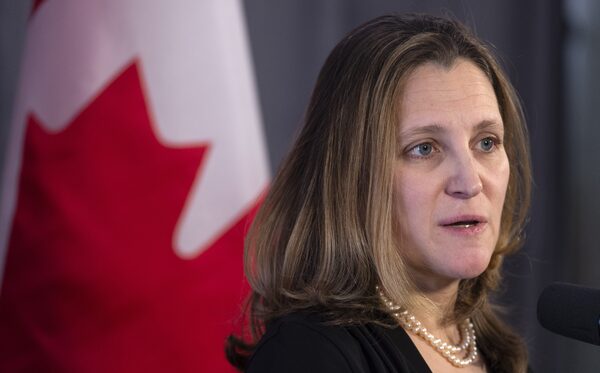
Foreign Affairs Minister Chrystia Freeland, seen here on Jan. 17, 2019, tweeted Wednesday that Canada 'firmly condemns Turkey’s military incursion into Syria.'Paul Chiasson/The Canadian Press
As Turkey wages its military campaign against Kurdish forces, Ottawa says it has contacted Syrian Kurdish officials requesting information about Canadians in their custody and has sought assurances from Turkey that Canadians detained would be dealt with according to international law.
More than 20 Canadian children have been trapped in camps in northeastern Syria for months after the crumbling of what’s known as the caliphate, according to Amarnath Amarasingam, an assistant professor at Queen’s University who researches extremism. Global Affairs Canada has maintained that it’s too dangerous for officials to offer consular assistance.
The danger intensified this week as Turkey launched an anticipated attack on the Kurdish-led Syrian Democratic Forces, allies of the United States and Canada, and a group that’s been instrumental in the U.S-led battle against the Islamic State. It has been guarding the prisons housing Canadians and people of other nationalities that experts say travelled to the region to join the Islamic State.
Foreign Affairs Minister Chrystia Freeland tweeted Wednesday that Canada “firmly condemns Turkey’s military incursion into Syria.”
“This unilateral action risks undermining the stability of an already-fragile region, exacerbating the humanitarian situation and rolling back progress achieved by the Global Coalition Against Daesh, of which Turkey is a member,” Ms. Freeland wrote, adding that Canada commends Turkey’s role in hosting Syrian refugees.
Natasha Nystrom, a spokeswoman for Global Affairs Canada, reiterated Thursday that the government is aware of Canadian citizens detained and is particularly concerned about Canadian children. “Given the security situation on the ground, the Government of Canada’s ability to provide consular assistance in Syria is extremely limited.
“We have reached out to Syrian Kurdish officials to seek information on Canadians in their custody and have sought assurances from Turkey that any Canadians detained in the region would be handled in accordance with international law. We continue to monitor the situation very closely," Ms. Nystrom said.
The Turkish operation began after a pullback by U.S. forces from the border, and senior members of U.S. President Donald Trump’s own party condemned him for making way for the invasion. The decision has been criticized as an abandonment of Syrian Kurds. More than 60,000 people have already fled their homes.
Jeremy Stoner, a regional director for Save The Children based in Jordan, said Canada and other countries should repatriate its citizens, saying it’s not too late.
“I believe that there still is a window of opportunity and I think that is a good thing to do. ... At the end of the day children, young children, have actually nothing to do with that conflict and they’re stuck in a dreadful situation," Mr. Stoner said.
From a security perspective, a large threat is that the Kurdish forces guarding the camps and prisons may have to leave their positions to provide reinforcement along the border, Mr. Amarasingam said.
He said there is chatter on Telegram channels, where people in the camps have been communicating about the conflict between the Turkish government and the Kurdish forces in case there’s an opportunity to escape.
“If things go really south with the Turkish presence, we could lose track of our prisoners, and that creates a whole host of new problems," he said.
Jessica Davis, a former senior strategic intelligence analyst with the Canadian Security Intelligence Service, said there’s been an overreliance on the Kurdish forces and that’s going to come to a head soon.
Ms. Davis said there are three likely outcomes that could result from an escape from the detention facilities: That those with links to the Islamic State will stay in the region and join a reconstituted force; they could leave the region and travel to where the Islamic State is active; or they could show up at a Canadian embassy or consulate.
“If they show up at Canadian embassies, they’re going to have to be repatriated,” Ms. Davis said, adding, “If there had been a controlled return of these individuals, our law enforcement and security services would be prepared for that … if these Canadians just start showing up at embassies and consulates, it doesn’t give a lot of time.”
With a report from Reuters
 Janice Dickson
Janice Dickson